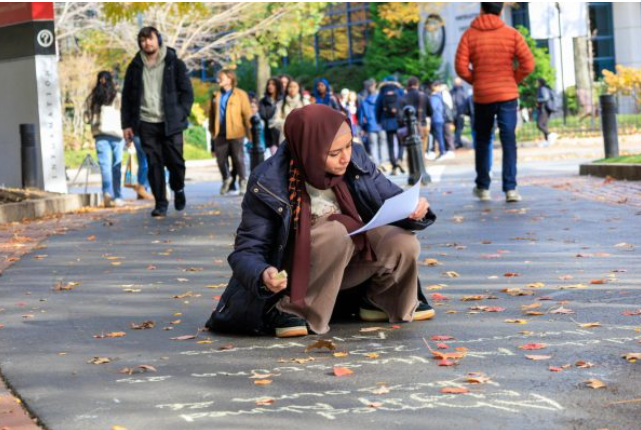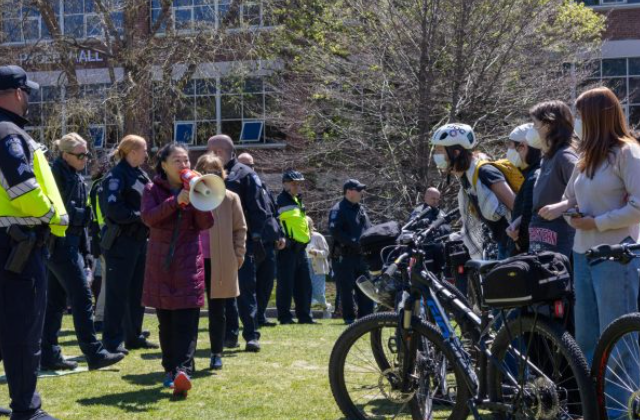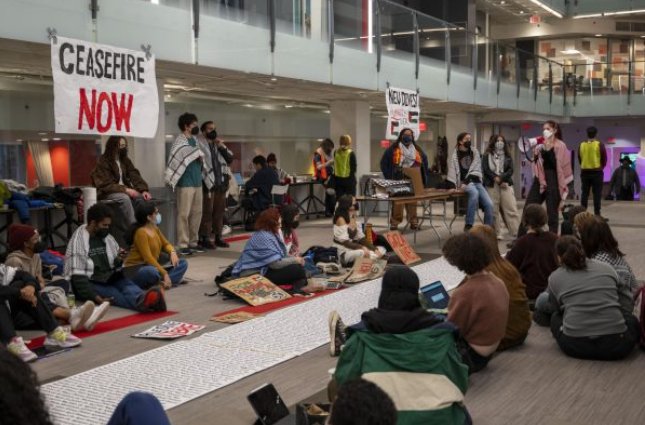
A group of over a dozen students and alumni submitted a complaint to the U.S. Department of Education’s Office for Civil Rights on August 12, calling for a federal investigation into Northeastern’s response to alleged discrimination against Palestinian and Palestine-supporting students around the time of the October 2023 Israel-Hamas conflict.
The complaint, sent via email on behalf of two officially recognized student organizations—Northeastern University Students for Justice in Palestine (NUSJP) and Northeastern University School of Law Students for Justice in Palestine (NUSLSJP)—was filed by fourteen individuals, including six current students, one inactive student, and seven alumni.
It claims that the university violated Title VI of the Civil Rights Act of 1964, which prohibits discrimination based on race, color, or national origin in federally-funded programs, including institutions of higher education.
Renata Nyul, Northeastern’s vice president for communications, stated in an email to The News, “In line with our longstanding policy, the university does not comment on ongoing legal matters. Our Code of Student Conduct is applied consistently, regardless of political perspectives, and we will maintain this policy in the upcoming academic year.”

This action represents the latest significant instance of pro-Palestinian resistance at Northeastern, following the mass arrest of protesters during an April encampment and a tumultuous academic year centered around the Israel-Hamas conflict.
The complaint includes three main allegations, claiming that the university fostered a hostile atmosphere for Palestinian and Arab students, imposed unjust disciplinary measures on pro-Palestinian activists, and responded more severely to pro-Palestine events than to pro-Israel ones.
The first allegation highlights multiple instances where students reported threats, discriminatory remarks, and online harassment to Northeastern’s Office of University Equity and Inclusion (OUEC). The complaint asserts that OUEC investigated but subsequently closed these cases, citing free speech protections or limited jurisdiction. The complainants argue that these dismissals indicate Northeastern’s failure to address anti-Palestinian rhetoric on campus, leaving Palestinian and Arab students feeling unsafe.
One complaint to OUEC came from a student affiliated with NUSJP, who felt “threatened” during a December 6 Huskies for Israel event after a guest speaker made pointed remarks, suggesting that “people who support Palestine should be deported or arrested in this country.” OUEC closed the case, stating it was outside their jurisdiction.
Another complaint was filed by Mariam Hassan, a second-year law student involved in NUSJP and NUSLSJP, who alleged she may have received unfair grades from a “vocally Zionist professor” due to her identity and her activism for Palestine. While her case with OUEC remains open, her grade appeal was dismissed.
The complaint also references a prior OUEC case from before the outbreak of the war: an “extensive report” alleging that a first-year law student had harassed multiple Palestinian and Arab students

The second allegation criticizes the university’s reliance on law enforcement and disciplinary measures to control pro-Palestinian demonstrations.
The complaint points out the significant presence of Northeastern, Boston, and state police on Centennial Common during the nearly 48-hour pro-Palestine encampment in late April. It accuses certain administrators, including Vice Chancellor and Dean of Students Chong Kim-Wong, of intimidating protesters verbally, while some officers from the Northeastern University Police Department (NUPD) are alleged to have used excessive physical force. As reported previously by The News, ninety-eight protesters were arrested, and several students faced deferred suspension as a consequence of the demonstration.
Additionally, a sit-in in December was heavily monitored by NUPD, leading to three students receiving deferred suspension. An incident in April during the university’s Holocaust and Genocide Awareness Week, centered around flyering, also prompted an NUPD investigation, resulting in disciplinary charges against the students involved.



Leave a Reply